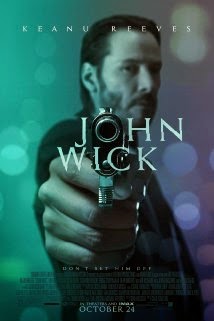 |
| Elijah Wood is a Maniac |
First and foremost, this is an impressive performance by
Elijah Wood. Second, what makes Maniac a
unique film is the smart use of cinematography.
The majority of the film is shot from the point of view (POV) of Frank’s
(Elijah Wood) eyes. We see what he sees
and we partake in what he partakes. We
only ever get a glimpse of him by reflective surfaces; mirrors or glass and
even televisions. I counted maybe three
or four times when the camera steps out of Frank’s POV, which I interpreted as
giving the audience a breathing room to process, just for a moment, the chaos
that is the maniac.
Making the choice to shoot the film in Frank’s perspective
not only puts the audience in the same shoes as a serial killer, but actively
seeks to engage the viewer on a deeply personal level. In most horror films the viewer is always a
third party observer. We are far removed
from really feeling the brutal carnage enacted by the killer(s). Making us one with the killer is an anxiety
inducing thrill that is hard to come by in cinema, and that impressed me.
From the title we can surmise that the protagonist, Frank is
mentally disturbed. And indeed, I was looking
for a specific illness that would illuminate his behavior, but what I
discovered to be the true root of his murderous impulse is a psychological
hatred for women. It would be easy to
categorize this statement as an isolated incident, and that Frank’s violent actions
are a neurological imbalance of his genetic makeup. It certainly can be argued that his
pathology is separated from society as a whole, but his criminal animosity is
more common and prevalent than we think.
I believe his influence was nurtured and conditioned by his environment:
A deeply misogynistic and toxic patriarchal society.
As is customary in filmmaking these days, a male protagonist
is not propelled into motion until he is triggered by the death of a prominent
female figure in his life. In Frank’s
case, his rage is released when his mother dies. Though we never witness her death, and nor do
we know the exact manner in which she had died, flashbacks to Frank’s childhood
indicate a complicated and often times inappropriate behavior.
Hiding in a closet, Frank is made privy to his mother’s
sexual prowess with multiple men. This also includes her drug use. Though bearing witness to his mother’s less
than ideal savior-faire attitude toward parenting does not turn a child into a
serial killer, it does explain the Oedipus complex he later develops that
becomes the foundation to his killing.
If his mother’s hypersexualized behavior affected Frank in a
deeply psychological manner, then the patriarchal and misogynistic attitude of
society further embedded the disgust and contempt of the female body, which
served as a trigger for the violence he perpetrated.
His obsession with mannequins also gives insight to how he
views his kills. To transfer his
projections of the women onto inanimate objects, his desire is to manipulate
and exert a sense of control. He turns
the women into mannequins in the same way an art collector buys auctioned
paintings: to have possession. They are
no real to him until he has killed and scalped them and placed them rightfully
in his collection.
But perhaps, in a startling scene, Frank’s violence toward
women is best depicted in his own deteriorating view of himself. Looking in the mirror, Frank is horrified to
see his genitalia has been replaced by the ambiguous bottom half of a
mannequin. It’s a scene that has strong
indication of his presumed sexual impotence.
His sexual release does not come
unless he is inflicting brutal violence toward the women he stalks.
As I said before, it is easy to write Frank’s behavior off
as an individualized pathology completely dissociated from society, but what
this film underlines is that in defining rigid forms of masculinity within the
vortex of gender binary, and making sexual promiscuity an imperative aspect of
manhood, the system of patriarchy distinguishes as it condones male violence as
virtuous traits that often carve a path to violence.
There is a depth of sociological understanding that goes
beyond this review, but as far as the film is concerned, the level of performance
and gore is unlike I have seen. I
recommend this Netflix pick for those interested in horror films that are not
campy or cheesy. This film is also not
for the faint of heart. Enjoy.




